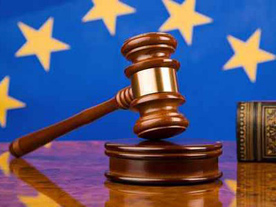Following the holding, on 1st October 2017, of the referendum on the self-determination of Catalonia (Spain), criminal proceedings were brought against Carles Puigdemont i Casamajó and Antoni Comín i Oliveres (who, at the time, were President and Member of the Autonomous Government of Catalonia, respectively). Since Mr Puigdemont and Mr Comín had left Spain, those proceedings were suspended until they were found. National arrest warrants were issued against them. Mr Puigdemont and Mr Comín subsequently stood as candidates and were elected in the elections to the European Parliament which were held in Spain on 26 May 2019.
On 29 May 2019, the President of the European Parliament issued an instruction stating, first, that all the candidates elected in Spain should be refused access to the ‘special welcome service’ provided to persons newly elected to the European Parliament and, second, that those candidates’ accreditation should be suspended until official confirmation of their election.
On 14 June 2019, Mr Puigdemont and Mr Comín requested the President of the European Parliament to take note of the results of the elections as declared by the Spanish Central Electoral Commission on 13 June 2019. They also requested the President to withdraw the Instruction of 29 May 2019 so that they could, inter alia, take their seats and enjoy the rights attached to their status as Members of the European Parliament from 2 July 2019, the date of the first plenary session following the elections.
On 17 June 2019, the Spanish Central Electoral Commission notified the European Parliament of the list of candidates elected in Spain. The names of Mr Puigdemont and Mr Comín were not on that list because, following their election declared on 13 June 2019, they had not taken the oath or promise to respect the Spanish Constitution, as required by national electoral law. That commission therefore declared that their seats were vacant and that all the prerogatives attaching to their duties were suspended until such time as they took that oath or promise.
By letter of 27 June 2019, the President of the European Parliament informed Mr Puigdemont and Mr Comín that he could not regard them as future Members of the European Parliament because their names were not on the list of elected candidates officially communicated by the Spanish authorities.
The following day, Mr Puigdemont and Mr Comín brought an action for annulment before the General Court of the European Union, mainly directed against the refusals of the President of the European Parliament to grant them access to the special welcome service and to recognise their status as Members of the European Parliament .
At the plenary session of 13 January 2020, the European Parliament decided to take note, following the delivery of the judgment of the Court of Justice in the case Junqueras Vies, of the election of Mr Puigdemont and Mr Comín to the Parliament with effect from 2 July 2019.
By judgment of 6 July 2022, the General Court dismissed the action brought by Mr Puigdemont and Mr Comín as inadmissible on the ground that the disputed refusals of the President of the European Parliament were not acts that were open to challenge. Mr Puigdemont and Mr Comín then brought an appeal before the Court of Justice.
In its judgment, the Court of Justice dismisses the appeal brought by Mr Puigdemont and Mr Comín.
The General Court correctly held that the President of the European Parliament could not depart from the list of elected Members which had been officially notified to him by the Spanish authorities. The President of the Parliament has no power to review the accuracy of that list, as otherwise the division of powers between the European Union and the Member States would be disregarded. Such a review is a matter for the national courts alone, where appropriate after making a reference to the Court of Justice for a preliminary ruling, or it is for the Court of Justice, when hearing an action for failure to fulfil obligations. The President of the Parliament merely did what he was required to do, namely to take note of the list of elected Members communicated by the Spanish authorities, which, for him, constituted a pre-existing situation that was based on the decisions taken at national level. The letter of 27 June 2019 therefore did not alter the legal situation of Mr Puigdemont and Mr Comín, and, was not, therefore, an act open to challenge.
As regards the Instruction of 29 May 2019, the General Court did not err in stating that that instruction was not the reason why Mr Puigdemont and Mr Comín were unable to take their seats in the European Parliament. It was because they did not appear on the official list of results notified by the Spanish authorities that they were unable to take their seats. The Instruction of 29 May 2019 therefore also did not alter the legal situation of Mr Puigdemont and Mr Comín.
The Court also states that the failure of the President of the European Parliament to exercise his discretion to take an initiative as a matter of urgency in order to assert the privileges and immunities of Mr Puigdemont and Mr Comín, which comes under a procedure that is separate from a request for the defence of privileges and immunities that can be made by Members themselves, could not be the subject of an action for annulment. In accordance with what the General Court had held, the Court of Justice also finds that the line of argument directed against the alleged refusal of the President of the Parliament to communicate to the competent committee the request of Mr Puigdemont and Mr Comín for the defence of their privileges and immunities was directed against a nonexistent act.
An appeal, on a point or points of law only, may be brought before the Court of Justice against a judgment or order of the General Court. In principle, the appeal does not have suspensive effect. If the appeal is admissible and well founded, the Court of Justice sets aside the judgment of the General Court. Where the state of the proceedings so permits, the Court of Justice may itself give final judgment in the case. Otherwise, it refers the case back to the General Court, which is bound by the decision given by the Court of Justice on the appeal.
Further information: CURIA







Leave a Reply